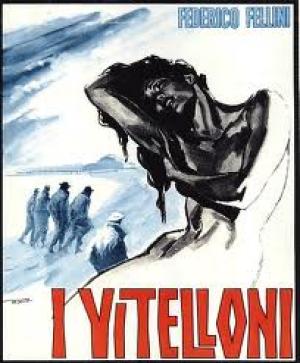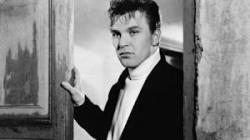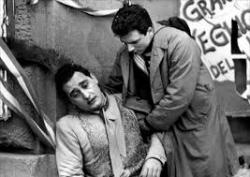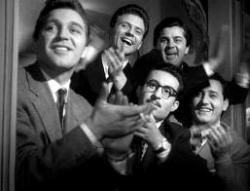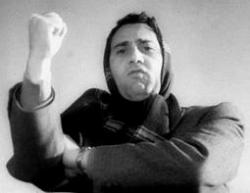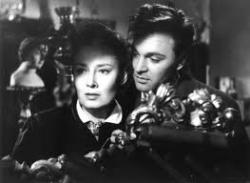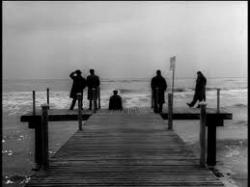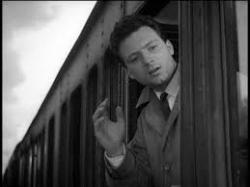Fellini and friends
By Michael Roberts
"Even if I set out to make a film about a fillet of sole, it would be about me.... All art is autobiographical. The pearl is the oyster's autobiography". ~ Federico Fellini
Federico Fellini was facing the possibility he'd be unable to raise funds for any further films if this one flopped, his first two (well, 1 1/2 in Fellini speak) being box office failures. His producer rejected his gritty idea for La Strada, and recommended he do a comedy, or at least something with a lighter tone than that proposed film, the one which would ironically make his international reputation. He reached out to his usual writing collaborators and produced a 'memory' of his own late adolescence in Rimini, centred around a group of friends for whom he concocted the collective noun 'vitelloni', which has since found its way into common use. Fellini's 'vitelloni' means, loafer, or sponge, in this case young, indolent men who live off the work of others, mostly family and often women. Fellini set the tale in a small provincial town where the boredom of post WWII life leads most to dream of escaping to more cosmopolitan Milan, or even to Rome, the eternal city.
Fellini tells the tale via Moraldo (Franco Interlenghi) his own stand in character who mirrors Fellini's observer status as a writer, both emerged in the action but staying somewhat detached. Moraldo's voice over tells us that Fausto (Franco Fabrizi) is the 'spiritual' leader of the group, an ironic comment given the hollow philosophy that 'vitellonism' engenders. Fausto is the secret lover of Moraldo's sister Sandra (Leonora Ruffo) and avails himself of the chance to chase women whenever he can, but with Sandra falling pregnant his womanising days are theoretically over. The other 'vitelloni' are Leopoldo (Leopoldo Trieste) is the intellectual of the group who writes plays, Riccardo (Riccardo Fellini) dreams of being a successful baritone and Alberto (Alberto Sordi) is living at home with his self sufficient sister and mother. Fausto proposes to Moraldo that they both leave together, but after it's revealed he'd be running away from his responsibilities with Sandra it doesn't happen and Fausto gets a job after the shotgun wedding. The boys loaf around town, spending time doing nothing, Fellini beat Seinfeld to it by 40 years!
Fellini composes a series of provincial vignettes, a beauty pageant, a wedding, a masquerade ball, or a theatre production that contextualises the community in which the 'vitelloni' live. Their own smaller collective inhabits poolrooms, or ocean piers, vacant town squares, and presents a gang in many ways removed from its environment rather than an integrated part of it. The process of gradual integration into the norm is what emotionally, possibly subliminally troubles the 'vitelloni', and it's the ennui of the not-yet-enfranchised that they experience. The integration is in fact so incremental that before they know it, they have become their father's, and this is what instinctively Moraldo realises.
Fellini sets a poetic component of the film in Moraldo's sweet relationship with a young paper boy who he bumps into occasionally, and they shoot the breeze about nothing in particular, but it reminds Moraldo that he was once this boy, and if he does not act decisively his future is bound to conform to a provincial life. The 'safety in numbers' aspect of being in a gang is also in itself a tacit repudiation of individual responsibility. Like most things, it's a double edged sword, and balance is required when these young men are held in tension between the impulse to break away and the urge to band together.
Fellini pokes fun at Italy's obsessive religious culture by having Fausto take a job in a religious icons shop. Religion here is ubiquitous and it represents how a culturally dominant meme can be passively woven into the collective consciousness, even if it involves some fairly dubious supernatural assumptions. To rebel against this dominant paradigm is almost as impossible as leaving town. The distractions from mundane reality, apart from the rituals indicated above, include the arrival of a baby, and Sandra finds solace in investing her focus on the next generation as her husband continues to avoid his responsibilities. Fausto's immaturity sees him come face to face with possible disaster, the sobering effect moves him inexorably towards the integration he fears, the Catholic brainwashing coming to the fore after his latest indiscretion, "now you feel guilty"? Alberto gets drunk at the ball, and next morning exclaims to Moraldo, "Who are you? you're nobody, we're all nobodies", the crie de couer of the insecure provincial. Fellini provides a degree of hope at the end,"We all talked about leaving, without a word to anyone one of us did".
Stylistically the film remains in the neo-realist tradition, but it hints of a poetic world beyond. The leftist champions of that successful Italian genre disliked the film, Fellini's avoidance of 'non actors', of more working class protagonists, in fact at one point Alberto gives a group of road workers an obscene salute, all added up to a film working outside the 'approved' neo-realist mode, but thankfully the audiences responded and made it Fellini's first hit. The performances are those of an ensemble in sync, all convincing and sure, and Alberto Sordi became a major star in Europe because of it. The Nino Rota score is a huge plus, and he would go on to iconic collaborations with Fellini throughout their long association. The camerawork is elegant and crisp, working equally well in the Von Sternberg-esque ornate world of the masked ball, or in the tight and crowded confines of the bustling indoor pageant scenes, and the lyrical scenes at the seaside are pure visual poetry.
Fellini has created a bittersweet 'reminiscence of youth', part autobiography and part confection, but a beguiling hymn to the possibilities of the young, and an ode to camaraderie. I Vitelloni is the work of a mature artist on it's own, but as he would demonstrate, this was just a taste of where his vision would lead him as he redefined the limits of neo-realism and eventually led it to another more personally expressive realm altogether. I Vitelloni is wonderful, essential Fellini.
